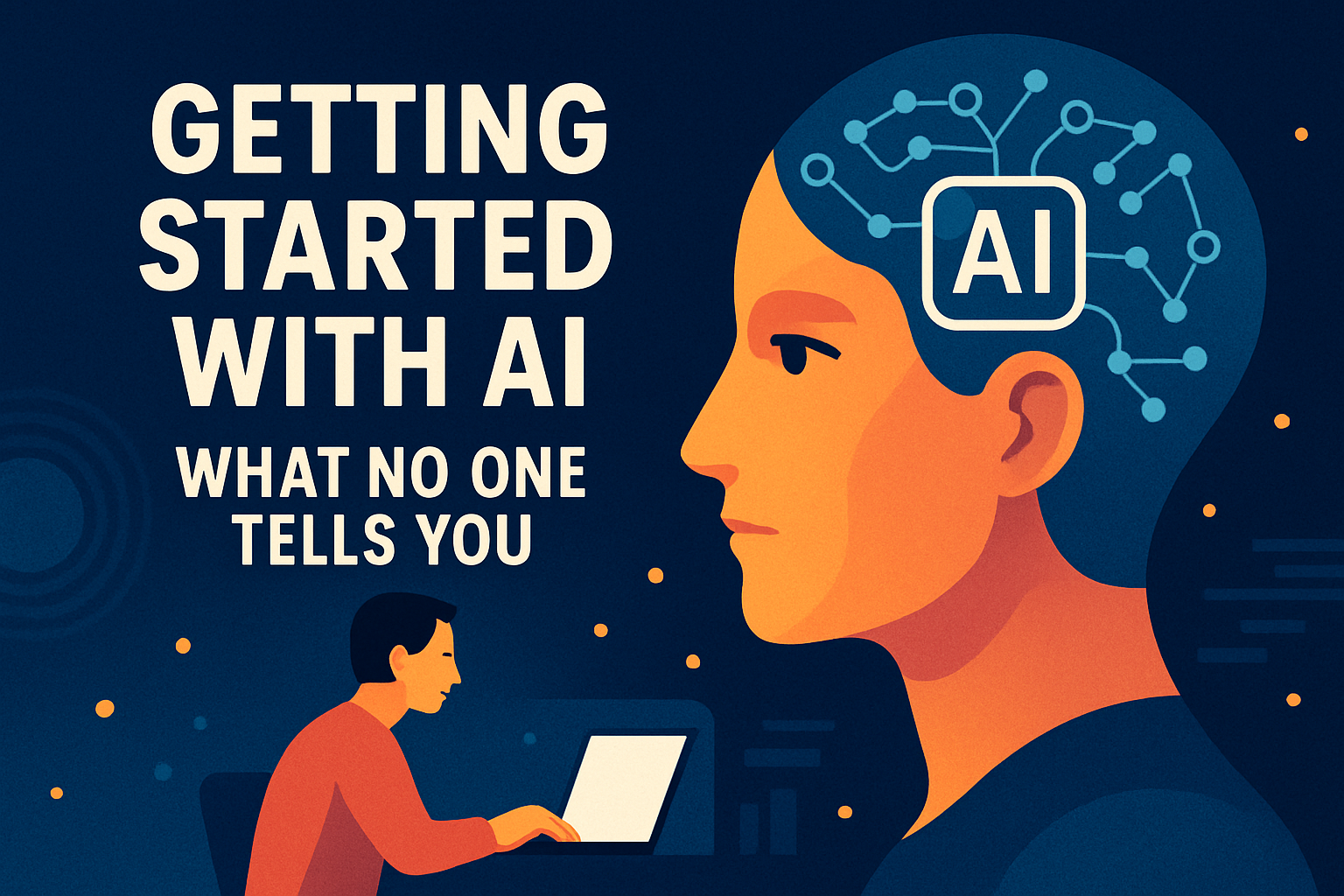
Artificial Intelligence (AI) is one of the most transformative technologies of our time. From ChatGPT to self-driving cars, AI is reshaping industries and creating new opportunities. But despite its rising popularity, most beginner guides gloss over the real challenges, expectations, and learning paths.
This article goes beyond the hype to uncover what no one tells you about getting started with AI — from choosing the right tools to managing expectations and building projects that matter.
Whether you're a student, entrepreneur, or developer, this guide will give you a grounded understanding of AI, so you can confidently take your first steps in the world of intelligent systems.
What Is AI Really?
AI isn’t magic. It’s math, code, and data — packaged in algorithms that mimic human reasoning, pattern recognition, and decision-making.
Core Types of AI
- Narrow AI: Designed to perform a specific task (e.g., spam filters, recommendation engines).
- General AI: A theoretical concept where AI can perform any intellectual task a human can (we’re not there yet).
- Generative AI: AI that creates content — like text, images, or music (e.g., ChatGPT, DALL·E, Midjourney).
Common Misconceptions
-
"AI will take all our jobs."
Reality: AI changes the nature of work but also creates new roles in AI ethics, prompt engineering, data annotation, and more. -
"You need a PhD to start with AI."
Not true. With tools like TensorFlow, PyTorch, and no-code platforms, anyone can begin experimenting.
The Tools and Skills No One Mentions
Learning AI isn’t just about algorithms — it's about developing an ecosystem of skills and habits.
Skills That Make a Difference
- Critical Thinking: Helps you question data quality, bias, and outcomes.
- Data Literacy: Understanding how to clean, analyze, and label data is more valuable than memorizing ML formulas.
- Basic Programming: Python is the go-to language due to its simple syntax and vast AI libraries.
- Version Control: Tools like Git let you track changes and collaborate on experiments.
Tools to Explore
- Google Colab: Free environment to run AI code with GPU access.
- Scikit-learn: Great for traditional ML models like decision trees and SVMs.
- Hugging Face: Repository of pre-trained models and datasets.
- LangChain: Useful for building AI agents and apps using LLMs.
🧠 Pro Tip: Don’t rush into neural networks. Master the basics of data science and classical machine learning first.
What Beginners Struggle With (But Won’t Admit)
Most people start excited but quickly feel overwhelmed. And that’s okay.
The Hidden Challenges
- Overhype Burnout: After reading too much about AI's potential, your projects might feel underwhelming in comparison.
- Too Many Choices: From model selection to data sources — decision paralysis is real.
- Imposter Syndrome: Everyone feels like they’re not smart enough at some point.
How to Stay Motivated
- Start small: Build a movie recommender or spam classifier.
- Share your work: Use GitHub or blogs to document your progress.
- Join communities: Reddit’s r/MachineLearning, AI Discord servers, and Kaggle forums offer tons of support.
Building Real Projects: Where Theory Meets Reality
Learning without doing is like reading about swimming without getting in the pool. You must build.
Project Ideas for Beginners
- AI Chatbot: Use OpenAI's API and create a simple support assistant.
- Image Classifier: Train a model to identify cats vs. dogs using TensorFlow.
- News Summarizer: Combine NLP and scraping tools to summarize current events.
Best Practices
- Use version control (Git) and keep your code clean.
- Track experiments with tools like Weights & Biases.
- Don't chase state-of-the-art results — aim for working prototypes first.
⚠️ Note: Preprocessing and cleaning your data will take up 60-80% of your time. Embrace it.
Conclusion: Step into AI with Realistic Optimism
Getting started with AI can be overwhelming, but it doesn’t have to be. The key is to:
- Understand what AI is (and isn’t).
- Build foundational skills — especially around data and problem-solving.
- Expect obstacles and impostor syndrome — they’re part of the process.
- Start small, iterate often, and connect with the community.
You don’t need to be a genius to dive into AI — just curious and committed.
Have questions about AI or want help starting your own project? Contact AJ Group — we’re here to help.